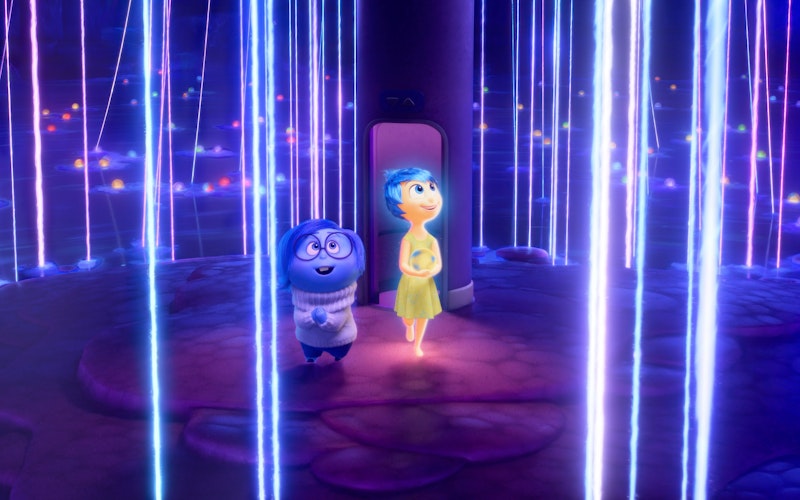
Movies
Seeing Romans 6 in Inside Out 2
The lies we tell ourselves take on concrete form in Inside Out 2, Pixar’s follow-up to its 2015 feature, which personified the emotions at play inside a young girl’s head.
At the start of Inside Out 2, Riley (voiced by Kensington Tallman) is now 13. Puberty has hit, bringing with it new emotions Anxiety (Maya Hawke), Envy (Ayo Edebiri), Embarrassment (Paul Walter Hauser), and Ennui (Adele Exarchopoulos). That makes for a crowded control room for Joy (Amy Poehler) to manage, especially as Anxiety becomes the dominant voice.
Even as it expands its cast of characters, Inside Out 2 also enlarges the animated landscape of Riley’s consciousness. As Riley experiences more of life, select memories are brought down to the “root level,” where they are planted in her Belief System. Thin, pale, glowing tendrils emerge there, each representing a belief she has about herself. Pluck the tendril—as Joy likes to do when she’s planting a memory in the Belief System—and you’ll hear that particular belief in Riley’s voice. (“Mom and Dad are proud of me” is one example.) As these beliefs coalesce and grow upward, they meet back in the control room to form a delicate, radiating sculpture that represents Riley’s Sense of Self.
Joy, however, has skewed this sense of self by only choosing pleasant memories to plant in the Belief System. It seems she hasn’t fully embraced the lesson she learned in Inside Out: Sadness (Phyllis Smith) is an essential part of the human experience too. And so when difficulty comes Riley’s way—involving a hockey camp that will determine her placement on the high-school team—the door opens for Anxiety to take control.
Given a panicked patter by Hawke and looking like a Fraggle Rock Fraggle that stuck its finger in an electrical socket, Anxiety means well. She’s mostly being protective, which is why she gets along so well with Fear (Tony Hale). But the memories she selects—much like Joy’s purely pleasant ones—lead to deceptive beliefs. Among the first of these is one Riley proclaims after an older member of the high-school team says something nice to her: “If I’m a Firehawk, I won’t be alone.” Later, during a fraught scrimmage in which she makes some mistakes, Riley repeats another new belief three times—“I’m not good enough”—eventually sending herself into a full-on panic attack. With each utterance, a red tendril emerges. Meeting the others, they form a jagged, fiery new sculpture in the control room to represent Riley’s remade Sense of Self.
The memories both Joy and Anxiety select lead to deceptive beliefs.
Riley repeating “I’m not good enough” reminded me of a trio of lies we hear in the Bible. After Peter denied knowing Jesus for the third time, his falsehoods were followed not by a goal horn, but by a rooster’s crow. Peter's own belief system, unsteady as it already was, completely crumbled. For anyone who has failed, spectacularly, to live up to their idealized conception of themselves, this is probably the most relatable passage in Scripture.
The truth is, the memories cultivated by Anxiety and Joy are both half-truths, especially when compared to Riley’s real-world experience. Riley’s parents are proud of her, but also disappointed when she fails a test, as we see in another memory that Joy decides isn’t worthy of the Belief System. At the same time, making the hockey team would mean new friends for Riley in high school, as Anxiety hopes, but it won’t mean she’ll never feel loneliness. And messing up in that scrimmage doesn’t mean she’s “not good enough.” As broken humans in a broken world, we are neither perfect in God’s sight nor completely worthless. Indeed, God chose us while we were still sinners.
What does this mean for Riley? Or, in the apostle Paul’s words, “Shall we go on sinning so that grace may increase?” Hardly. (Spoilers ahead.) After Riley’s panic attack subsides—with Joy gently pulling Anxiety from the glitching dervish she’s succumbed to in the control room—Joy decides to add a few painful memories to Riley’s Belief System. Their blue tendrils merge with the pale and red ones already there, forming a purplish new Sense of Self sculpture in the control room. This one recognizes Riley’s limitations as an awkward 13-year-old in an unfair world, but it’s not defined by those realities alone.
Similarly, Paul tells us later in Romans 6, “. . .count yourselves dead to sin but alive to God in Christ Jesus.” And, “. . . offer yourselves to God as those who have been brought from death to life; and offer every part of yourself to him as an instrument of righteousness. For sin shall no longer be your master, because you are not under the law, but under grace.” If there’s an Inside Out 3, where things turn from the psychological to the spiritual, this is a new character I’d like to see: Grace.
Voiced by Mavis Staples, of course.
_______________
At Think Christian, we encourage careful cultural discernment. We recognize and respect that many Christians choose not to engage with pop culture that contains particular content, such as abuse, sex, violence, alcohol or drug use, or that employs the use of coarse language. To that end, we suggest visiting Common Sense Media for detailed information regarding the content of the particular piece of pop culture discussed in this article.
Topics: Movies